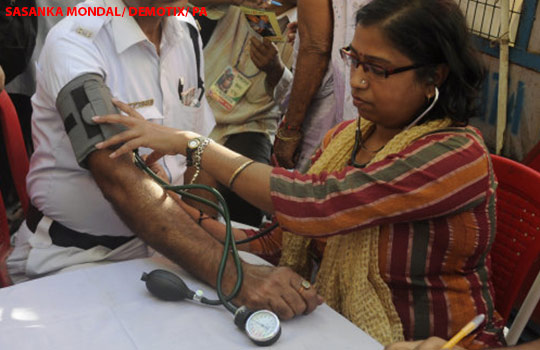Research institutes have an important role in addressing India’s NCD burden
 Non-communicable diseases (NCDs) account for 60% of the total number of deaths in India, while the probability of death in the 30-70 years age group from the four main NCDs is 26%. The World Health Organization (WHO) has identified several gaps in India’s national system response to NCDs, of which lack of data is one. The WHO’s report explicitly states that “The mortality estimates of this country (India) have a high degree of uncertainty because they are not based on any national NCD mortality data.” India is not alone in being singled out as lacking this data, yet it highlights the important role research institutes will have if India is to address its NCD burden.
Non-communicable diseases (NCDs) account for 60% of the total number of deaths in India, while the probability of death in the 30-70 years age group from the four main NCDs is 26%. The World Health Organization (WHO) has identified several gaps in India’s national system response to NCDs, of which lack of data is one. The WHO’s report explicitly states that “The mortality estimates of this country (India) have a high degree of uncertainty because they are not based on any national NCD mortality data.” India is not alone in being singled out as lacking this data, yet it highlights the important role research institutes will have if India is to address its NCD burden.
I’d argue that there are four key steps research institutes need to take—represented by the acronym “ACTS’’—if they are to play a greater part in addressing the burden of NCDs in India.
A. Actionable research
C. Collaboration
T. Translational research
S. Surveillance
Actionable research: The skill of processing raw data into information and knowledge is the forte of research institutes. However, knowledge is only potential power, and unless that knowledge gets converted into action its potential remains untapped. Currently, large volumes of research and data remain unused in such institutes so they need to be more proactive in transforming the potential energy of this knowledge into the kinetic energy of action. The researchers in these institutes need to do more work in translating such evidence into practical recommendations, which are useful for policy makers and programme managers.
To bring about a movement of converting research papers into policy-programme briefs, we need a shift in perspective and priorities. Research mentors would need to teach young researchers enrolled in these institutes’ research programmes how to generate timely and relevant research that is actionable. This requires cultivating specific skillsets for collecting and analysing data on an identified problem within a short period of time, as well as skills to convert technical academic jargon into plain language policy briefs, which are understandable to policy makers.
Collaboration: We live in an extremely interconnected world with the ability to exchange complex information at our fingertips. However, unfortunately, the sharing of learning and information among research institutes across the country is limited. NCDs can be a starting point on the path to creating more collaborative networks among institutes, where they can exchange ideas and information. The cost of creating such a virtual network is minimal, but it has the potential to influence policy and mobilise programmes on NCDs.
Translational research: Tremendous advances have occurred in NCD research over the
past decade. Yet numerous studies in the real world in various settings have found that NCD care, especially for diabetes, does not adhere to evidence based practice. Research institutes need to address this discrepancy.
This challenge comprises two phases: from bench (laboratory research) to bedside (clinical research) and from bedside to community. Currently, very few randomised controlled trials in India measure cost effectiveness; evaluate innovative community approaches; or study NCDs in the context of poverty, gender discrimination, and undernutrition. Consequently, some questions and areas that can and should be addressed by research institutes include identifying and understanding the current barriers and potential facilitators to translating research into practice, economic studies of translation, community based participatory approaches, and addressing NCDs in vulnerable populations. A multidisciplinary (epidemiologist, economist, sociologist, clinical medicine, etc) research team is needed to approach the problem of NCDs, which again brings us back to the previous goal of collaboration.
Surveillance: Continuous scrutiny and monitoring of NCDs would provide the crucial data we need to understand the prevalence of these diseases, as well as to monitor India’s progress towards achieving NCD targets. Using a common methodology to carry out this surveillance is critical for validating, comparing, and monitoring trends. Yet there is currently no national population based registry for NCDs and a lack of uniform methodology has been a problem across various surveys. Research institutes can act as regional sites that conduct such surveillance studies and use common tools. Yet, crucially, this will require robust collaborative action and strong stewardship.
If the principles of ACTS are acted upon in every research institute in India, they can address the NCD challenge. The gap between academia/researcher and policy maker/programme manager needs to be bridged. They both need to speak the same language. This will be the most important step for addressing the NCD challenge in India.
Kanchan Mukherjee is a medical doctor who specialises in public health, health policy, and health economics. He is currently a professor at the Tata Institute of Social Sciences, Mumbai.
Competing interests: I have read and understood BMJ policy on declaration of interests and declare the following interests: None.
